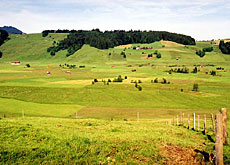Swiss lukewarm about implementing water policy

Switzerland has one of the best water protection policies in Europe, according to a new study by the environmental group, WWF.
But ecologists argue that although the country has good water laws on paper, in reality they are not always put into practice.
The WWF’s Water and Wetland Index – Critical issues in water policy across Europe, which was published on Thursday, surveyed 23 European countries’ water management policies.
Switzerland was rated top in terms of wetland management and third in water management, making it one of the highest scoring countries in Europe.
But Andreas Knutti, from WWF Switzerland, warns that the Swiss cannot afford to be complacent about the results.
“On a European level, Switzerland certainly has progressive laws and instruments for improving and restoring areas of water, but it deserves bad marks for failing to implement these regulations,” said Knutti.
The study found that the cantons in particular were lagging behind in carrying out water protection measures, especially in the preservation of meadows fed by rivers and in the redevelopment of artificial watercourses.
Knutti said water protection agencies would benefit from more political clout. He added that other measures needed to combat the problem included a more integrated water policy and increased cooperation between cantons and communes.
Water consumption
The WWF warned that Europe’s water resources still faced critical problems such as overuse, pollution and the lack of integrated water management policies.
The organisation said that these topics were not being tackled, despite the adoption of the new European Union water law in 2000 – also recognised in Switzerland – which aims to protect European freshwater ecosystems.
“Excessive water consumption is a problem across Europe, where water is mostly treated like an infinite resource and one which will always be clean, pure and available,” said Lucia de Stefano, the study’s coordinator.
“Having good water quality costs money and also has an impact on freshwater ecosystems, which provide water. Without proper management of our water consumption, as our report shows, it won’t be long before everyone starts losing out,” she added.
The WWF said the results showed that governments were generally failing to deal with domestic and agriculture water consumption problems – with many increasing water supply to meet demand instead of reducing water consumption.
Other high ranked countries in the survey included Belgium-Flanders and Finland but Italy, Greece and Spain languished at the bottom of the ratings and came in for particular criticism concerning the use of water in agriculture.
The report was the second part of a wider European water survey. Part one, published in April 2002, contained an index of water and rivers.
swissinfo
Between 1940 and 1990 the global consumption of water increased fourfold.
Typical average daily consumption of water per person in Europe is 150 litres.
Typical average daily consumption of water per person in the Sahara region is 30 litres.
30 litres of water is used a day per person for toilet flushing in Switzerland.

In compliance with the JTI standards
More: SWI swissinfo.ch certified by the Journalism Trust Initiative










You can find an overview of ongoing debates with our journalists here . Please join us!
If you want to start a conversation about a topic raised in this article or want to report factual errors, email us at english@swissinfo.ch.